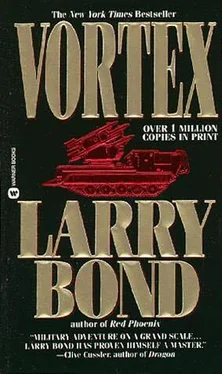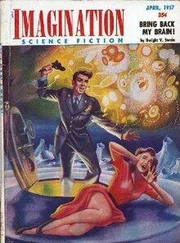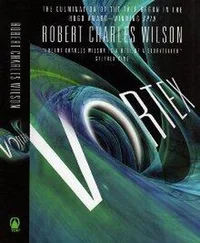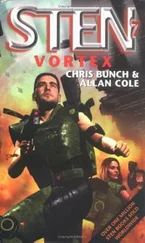Diederichs was thrown against his seat belt as the Alouette, caught in a sudden updraft of superheated air, bucked skyward and then fell toward the water like a rock before the pilot regained control. He glared left through the canopy to where sheets of orange-red flame more than a hundred meters high marked the site of one of the day’s worst human and economic disasters-the destruction of the Shell Oil refinery’s main tank farm.
Early in the fighting, stray cannon shells and mortar rounds had slammed into several of the storage tanks-igniting a conflagration that had already consumed at least fifty lives and precious oil worth tens of millions of rands. Hours later, the fire still raged out of control, kept back from the refinery only by a series of massive earthen berms and the heroic efforts of virtually every surviving firefighter left in Durban.
Diederichs stared at the manmade inferno roiling below, all too conscious of how narrowly he had escaped total disaster. The Shell facility alone supplied nearly 40 percent of South Africa’s refined petroleum products-fuel oil, petrol, and diesel. The oil destroyed in storage could be replaced in days. But the refinery itself was essentially irreplaceable.
And no government-especially not one headed by Karl Vorster -would have looked with favor on anyone even remotely connected with its loss. This rebellion was bad enough.
He shifted his gaze toward the city center. His best troops were down there, fighting their way from house to house through the heart of Durban’s
Indian business district. He spotted more smoke rising from stores and shops either set aflame by the rebels or demolished by armored-car cannon fire.
One enormous pillar of smoke stained the sky above a shattered pile of white stone.
Diederichs’s lip curled in disgust. The Great Mosque of Grey Street was said to have been the largest Islamic religious site in southern Africa.
The Moslems among South Africa’s Indian minority had built it with their own money and hard labor over long years. Well, he and his troops had shown the koefietjies-the little coolies-how quickly and how easily Afrikaner explosive shells could knock it down. Hundreds of dead or dying men, women, and children lay sprawled among the mosque’s shell-torn arched passageways and collapsed sanctuary.
Brig. Franz Diederichs nodded to himself, pleased by the sight of the carnage. Durban’s mongrel population of blacks and coolies had surprised him once. They would not do so again. He’d see to it that they were too busy counting their dead to trouble South Africa’s peace for a generation or more.
Rifle and machinegun fire continued to rattle across Durban’s corpse-strewn streets all through the night.
NOVEMBER 4-NATIONAL SECURITY COUNCIL MEETING, WASHINGTON, D.C.
A cold, driving rain soaked the capital’s parks and public buildings, puddling on oil-slick streets and knocking dead and dying leaves off the trees onto the pavement. One by one, the city’s streetlamps flickered on-triggered by simpleminded sensors that believed the dull-gray half-light must signal the approach of night.
In the Situation Room, two stories below the White House grounds, a shift from pitchers of iced lemonade to hot coffee marked the only concession made to Washington’s worsening weather. There were differences, though. The
Situation Room might remain untouched by the passing seasons, but it did reflect the changing world scene. On one wall, a map of sub Saharan Africa had replaced that of the Soviet Union. And the faces of the men and women seated around the room’s single table were as gloomy as the weather above.
The sardonic amusement generated by listening to a replay of Vorster’s rabid speech had died quickly after the secretary of commerce’s terse reminder that South Africa’s president might well be as mad as a hatter, but his policies were still wreaking havoc on the economies of the world’s industrialized nations.
The shadows and new lines on Hamilton Reid’s handsome face showed his fatigue and concern.
“Strategic minerals prices are rising even faster than we expected.” He shook his head wearily.
“Frankly, I think it’s likely we’ll see the cost of chromium, platinum, and the others tripling by the end of the month “
Christ. Vice President James Malcolm Forrester forced himself to nod expressionlessly as others around the table showed their dismay. All of those minerals were essential to a wide range of industries, and the drastically higher prices being paid for them meant a surge in inflation and interest rates around the world. The fact that it had been predicted earlier was no comfort. It still spelled disaster for the nation’s economy.
Edward Hurley leaned back, the Situation Room’s overhead lighting momentarily reflected in the thick lenses of his tortoiseshell glasses.
“It’s only going to get worse, Mr. Vice President. We’ve all seen the latest intercepts and smuggled video footage. South Africa’s falling apart faster than anyone ever dreamed it possibly could.” He shrugged.
“Vorster seems to be on the verge of losing all control over the country’s major ports. The equation’s pretty simple-no ports means no exports. And no minerals exports coming out of South Africa means panic-buying around the world as companies and countries scramble to make up the difference elsewhere. “
Forrester nodded and looked toward the paunchy, whitehaired man sitting uneasily at the opposite end of the table.
“Can you cast any further light on all of this, Chris?”
Christopher Nicholson, director of the CIA, shook his head
reluctantly-chagrined at being caught out in front of his peers. His subordinates were already taking bets about which of their colleagues’ heads would roll because of the fiasco.
“I’m afraid all my data has been overtaken by events, Mr. Vice President. My people had been trying to confirm the Blue Train massacre story aired by this reporter, but Vorster told the whole world last week that he did it and he’s not sorry. “
The CIA director paused briefly and then passed two documents down the table to Forrester.
“Other than that, we have an updated list of arms shipments to both sides in the Namibian war, and a bio of Sheffield, the reporter who actually broke the story.” Nicholson’s embarrassed tone made it clear that he considered the information less than useful.
Forrester sat back, idly scanning the papers, then half-threw them down.
“Any further word on this Sheffield character?”
Nicholson shook his head again.
“I’m afraid not. We don’t think the South
Africans have him in custody, because they’re still maintaining a round-the-clock surveillance on our embassy in Pretoria, Based on that, we think he’s still hiding out somewhere in Johannesburg. “
“Any chance of helping him get out of the country?”
Nicholson opened his mouth, but Hurley beat him to the punch.
“I don’t think that would be a good idea, Mr. Vice President.” The short, bearded assistant secretary of state tapped his pen lightly against his glasses, thinking aloud.
“Vorster’s security boys have our intelligence assets inside South Africa pretty closely watched. If they spot us making a move toward Sheffield, they’d be bound to use that to bolster some kind of claim that he’s nothing more than an American spy “
“So you’re proposing that we just leave this guy dangling out there all alone?”
Hurley nodded somberly.
“I don’t see what else we can do, sir. We’re not likely to be able to help him, and even the attempt to find him could draw South African security forces to his real location.” He paused.
“Wherever that is.”
“Very well.” Forrester looked down at his hands, feeling suddenly tired and a lot older than his years. As usual, Hurley reasoning was impeccable, but that didn’t make the decision any more palatable.
Читать дальше












